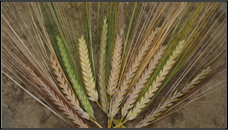Dorothea Bartels
Drought stress tolerance in cereals: what can we learn from genomic approaches and model plants?
Dorothea Bartels, IMBIO (Molekulare Physiologie und Biotechnologie der Pflanzen), University of Bonn, Kirschallee 1, D-53115 Bonn Germany, dbartels@uni-bonn.de
Drought and salinity are one of the major constraints leading to reduced productivity and yield losses of crop plants. The responses of plants to drought or salinity are complex and trigger various changes on different levels of plant organization involving an array of physiological and biochemical modifications. Responses on the molecular level include signal transduction and major changes in gene expression. The genetic model plant Arabidopsis thaliana is the best studied plant on the molecular level. However, studies have recently been extended to cereals, mainly rice, wheat and barley or desiccation tolerant plants and others. Several genes have been identified which contribute to drought tolerance. Some examples will be described. The isolated genes target different traits and often the function is not fully understood. One group of genes which has been suggested for crop improvements are genes encoding DREB (dehydration responsive element binding proteins) genes. DREB genes encode transcription factors that regulate the expression of multiple stress-inducible genes. It has also become apparent that research from model plants cannot always be directly applied to cereals grown under field conditions. Possibilities and limitations to improve stress tolerance in crops will be discussed.




